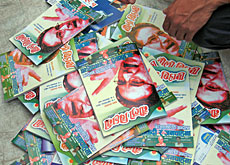Switzerland optimistic about Nepal peace deal

The Swiss government says it has faith in the peace accord reached earlier this week between the Nepalese government and Maoist rebels.
The agreement, which puts a formal end to the ten-year rebel insurgency in Nepal, is the fruit of a six-month peace process, which received support from Switzerland.
“Switzerland assisted both conflicting parties in framing the peace agreement,” Jörg Frieden, the country director of the Swiss Development Agency (SDC) in Nepal, told swissinfo.
“The work of our special adviser was part of a broader effort as we have clearly been in favour of restoring democracy.”
After the deal was signed on Tuesday Bern announced it was sending a military planning expert to Nepal to assist the United Nations in its peace building activities for three months.
“The Swiss government has recently decided to invest further SFr18 million ($15 million) for rural infrastructure, which is a sign that we trust the process and see the necessity to bring benefit to the rural people,” Frieden said.
Continuing efforts
Switzerland has been active in Nepal for more than 40 years and has continued its efforts in the Himalayan Kingdom despite the Maoist insurgency that killed more than 13,000 people.
One of the main challenges now, Frieden thinks, is to abolish the “double-state” Nepal has been living with for the past ten years.
“The Maoists have always wanted to control our development activities. The day when the historic deal was signed, a Maoist group came into one of our project offices telling us to stop our work due to a conflict they had had with the district administration.”
According to newspaper reports Maoist rebels and police forces continued to clash across the country even after the deal had been signed, with rebels still collecting illegal taxes and trying to forcefully recruit children into their militia.
Under the deal the Maoist rebels, who had been considered terrorists until May this year, are supposed to put their weapons under UN supervision. They will also join a transitional government on December 1 and an interim government should be in place by June next year.
One major bone of contention is the future of the monarchy, which the Maoists want to see abolished in the near future. King Gyanendra, who took absolute power in February last year, was forced to give up his direct rule in April following nation-wide street protests that killed 21 people.
Spontaneous celebrations
Thousands of people were glued to their television screens, when Nepal’s prime minister Girija Prasad Koirala and Maoist leader Prachanda signed the deal in the capital Kathmandu.
“The atmosphere was extremely positive. The body language and the communication between Koirala and Prachanda showed trust. It was what everybody had been waiting for,” Frieden said.
After the deal was signed on Tuesday evening thousands of people took to the streets to mark the formal end of the conflict.
The peace deal received international support and the UN, which had sent a special envoy to Nepal, congratulated the two parties on their achievement.
“Through ending the armed conflict, the people of Nepal now have the opportunity to build lasting peace in an inclusive democracy,” Kofi Annan, the UN Secretary-General, said in a statement.
swissinfo, Billi Bierling in Kathmandu
Nepal is one of the Swiss Agency for Development and Cooperation’s (SDC) priority countries. The SDC in Nepal works mainly in rural areas, which are at least partially controlled by the Maoist insurgency.
The agency is active in rural infrastructure development, building suspension bridges and roads.
It is also involved in activities linked to the conflict such as human rights initiatives, both nationally and at local level.
Population of Nepal: 26.3 million.
The Maoist rebels have been fighting to abolish the monarchy since 1996. The insurgency has left more than 13,000 people dead.
In April this year King Gyanendra reinstated parliament and gave up direct rule, following mass anti-monarchy protests.
On November 8 the two sides agreed on the deal, which was the first major step towards peace.
A transitional government will be formed by December 1 and an interim government should be in place by June next year.

In compliance with the JTI standards
More: SWI swissinfo.ch certified by the Journalism Trust Initiative












You can find an overview of ongoing debates with our journalists here . Please join us!
If you want to start a conversation about a topic raised in this article or want to report factual errors, email us at english@swissinfo.ch.